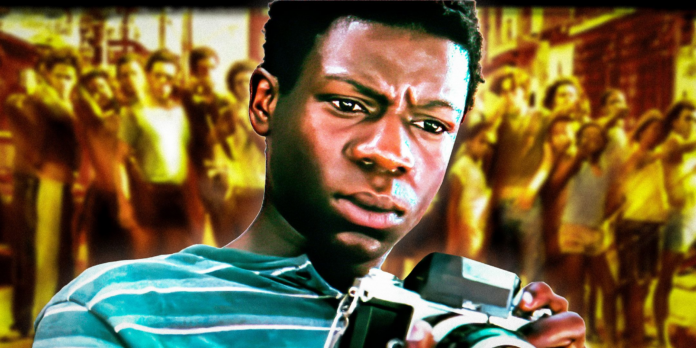This article contains mentions of rape.
City of God ends with a shooting involving the gangs led by Li’l Zé and Knockout Ned, with the outcome of the war proving that the cycle of violence that allowed Li’l Dice to grow into a ruthless drug dealer is bound to continue. The third act of City of God brings the movie full circle, as it goes back to the opening scene of Rocket getting himself between the police and Li’l Zé’s gang as a war between the drug dealer and Knockout Ned is about to begin.
What follows is an intense, bloody shooting during which Li’l Zé appears to be arrested but proceeds to walk away freely. Li’l Zé is then ambushed and gunned down by a group of kids. One of the greatest movies of the 2000s, City of God is a turning point in Brazilian cinema and is among the most influential pieces of media of its generation. City of God was directed by Fernando Meirelles and Kátia Lund, with a script by Bráulio Mantovani based on Paulo Lins’ City of God book, which itself was based on real experiences and research.
Why The Cops Don’t Arrest Li’l Zé
Li’l Zé Is Arrested But Let Go Immediately
Close
As established earlier in City of God, Li’l Zé kept the police in check through bribery. As the head of the drug business and virtual ruler of the City of God in the last couple of years, Li’l Zé never felt threatened by the police. Once the war between Li’l Zé and Knockout Ned started, the police got involved. However, despite having the chance to arrest Li’l Zé amid the shooting, the cops accepted bribery and let him go. This was a brief but significant illustration of the balance of power and corruption in the City of God.
Who Are The Runts & Why They Kill Li’l Zé
The Runts Ambushed And Shot Li’l Zé Dead
The Runts kids were introduced midway through the movie and illustrated the endless cycle of violence caused by all the social and economic problems in the community. They were a reminder of how Li’l Zé’s criminal life had started – misguided kids living in poverty and being raised around extreme violence. Li’l Zé had killed one of the Runts earlier in the film, which is why the kids wanted revenge.
Most of the main cast of City of God, particularly the young characters, were not professional actors. Director Fernando Meirelles cast local members of the community, who were then enlisted in an acting camp before filming began.
By killing Li’l Zé, the Runts were not only avenging their friend but also taking Li’l Zé’s spot as the head of the drug business. City of God ends with the Runts planning their takeover of the neighborhood following Li’l Zé’s death as they list all the people they ought to kill. It is a bleak, hopeless ending to the film that indicates history will repeat itself as the cycle will continue. The Runts are essentially the new Li’l Dices, who will now grow up to become the new Li’l Zés.
Why Rocket Doesn’t Publish All The Photos He Took During The Shooting
Rocket Had Photos Of The Cops Letting Li’l Zé Get Away
Rocket’s dream of becoming a photographer is the character’s main driving force in the latter half of the movie. While he slowly begins to fulfill his dream and even starts selling his photos to a newspaper, Rocket decides not to publish all of the material he got during the shooting. He had pictures that would prove the cops were being bribed but chose to only publish the ones showing Li’l Zé’s body. Although Rocket could have become famous, he most likely feared what would happen to him if he exposed the cops.
Related The 60 Best Movies Of All Time Screen Rant breaks down the best movies of all time, from old classics to modern masterpieces across multiple genres of cinema.
Rocket’s decision to only publish the pictures of Li’l Zé’s body is very symbolic and ties into the movie’s larger message of how that cycle might never end. Although Rocket always wanted to do the right thing, one photographer would not be enough to change things in the City of God. The fact that he survived and made a career with his photos while a lot of friends, family, and colleagues around him either died or went to jail also speaks to the challenges faced by those who grow up in violent, crime-dominated favelas.
City Of God’s Credits Explained: Was It Based On A True Story?
City Of God’s Ending Credits Include A Real Interview
City of God was based on a true story and included characters based on real people, although some names and locations were changed. Both Knockout Ned and Li’l Zé existed in real life, with their war also beginning after Li’l Zé raped Knockout Ned’s wife. City of God’s ending credits feature an interview from the real Knockout Ned to TV Globo after a shootout against Li’l Zé’s men, reminding viewers that most of what they had just watched was indeed based on a true story.
While City of God takes place in the titular community, the actual war between Knockout Ned and Li’l Zé happened in Cidade Alta, a different location.
The real Knockout Ned, Manoel Machado Rocha, was arrested in May 1979 but was freed shortly after. In September of that same year, Knockout Ned was ambushed and killed by Li’l Zé and his men. José Eduardo Barreto Conceição, the drug boss on which City of God’s Li’l Zé was based, died in the 1980s, although it is unclear how it happened. While City of God takes place in the titular community, the actual war between Knockout Ned and Li’l Zé happened in Cidade Alta, a different location.
What Happened To The City Of God Neighborhood After The Movie
The Community Continued To Deal With Multiple Issues
The tremendous success of City of God in 2002 put the neighborhood – as well as plenty of other favelas – in the spotlight. Some immediate measures were taken in the years that followed, including the creation of a Community Committee formed by local entities. In addition to all the structural problems faced by the favelas, the City of God community had to deal with a lot of discrimination and misinformation that came with the film.
As of 2024, Rio de Janeiro had 29 UPPs but with plans to reduce the number of active ones to 16.
In 2009, the City of God was one of many regions to be occupied by a Pacifying Police Unit, or UPP, a Rio de Janeiro state program that sought to reclaim control of the favelas that had been taken over by drug dealers. While the UPP program brought positive results initially, it also led to other problems, including but not limited to a lack of resources to run the communities and the eventual return of violent conflicts.
What City Of God’s Ending Really Means
City Of God’s Ending Is Not A Hopeful One
Even though Rocket survives and gets an internship at the newspaper, City of God ends on a very bittersweet note and leaves little hope that things will get better. Li’l Zé’s death at the hands of a group of kids is tragically symbolic, calling back to when Li’l Dice himself was a kid who also entered a life of crime at a very young age. The choice to include Knockout Ned’s interview during the credits, revealing the film was based on a true story, further added to its message.
Is There A Sequel To City Of God?
Rocket’s Story Continued 20 Years Later
While City of God never got a theatrical sequel, Rocket’s story was recently revisited in the Max original series City of God: The Fight Rages On. Alexandre Rodrigues, who played Rocket in the original film, reprised his role for the Max series. The Fight Rages On takes place 20 years after City of God and sees Rocket, still working as a journalist photographer, returning to his old neighborhood to document current conflicts involving not only drug dealers but also the police and militiamen.



